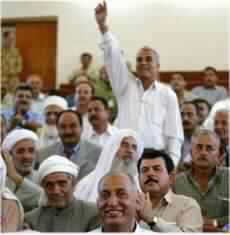- Author:
AP - Section:
WORLD HEADLINES
Arabs, Turks May Boycott Iraq Mayor Vote

Arabs and Turks in Iraq's main northern oil city threatened Sunday to boycott a vote for mayor as an American general approved six final members of a city council charged with healing ethnic feuding that is threatening the region's stability.
Bitter squabbling prevented the six from being sworn in a day earlier, and the intervention by Maj. Gen. Ray Odierno, commander of the 4th Infantry Division, did little to soothe the ethnic passions that roiled the first meeting of the 30-person city council.
Arabs and ethnic Turks immediately threatened to boycott a vote for mayor, saying the post was certain to go to a Kurd. The meeting adjourned in the late afternoon after Arab delegates asked for a delay until Monday - a move some saw as a stalling tactic.
The Arabs "were not ready to propose candidates (for mayor), and we accepted the request for a delay," said Kamal Karkuki, a Kurdish delegate.
U.S. officers cautioned, though, that the elections would be too important for the groups to boycott.
The Kirkuk region, which produces almost half of Iraq's oil, is populated by an explosive mix of Kurds, Arabs, ethnic Turks and Christians. Ethnic tensions turned violent earlier this month when Kurds and Arabs fought, leaving about 11 people dead.
The Kirkuk city council, elected Saturday by a group of 300 delegates approved by the U.S. military, reflects that mix.
Each of the four main ethnic groups elected six delegates from among their own. Six independent delegates also were elected, but Arabs and Turks protested after it became clear those seats would be filled by five Kurds and one Christian.
The situation became so heated that Odierno, who is overseeing the balloting, intervened and said he would review the voting for the independents. Odierno must approve the independents and had said he would take their ethnic makeup into account.
Delegates met Sunday at a heavily fortified government building to hear Odierno's decision. About a dozen U.S. soldiers in bulletproof vests and carrying assault rifles stood by the door to the auditorium where the meeting was held.
"I have reviewed the procedures of yesterday's advisory vote," Odierno said. "I found no procedural problem with the independent vote."
Odierno then swore in the six independent delegates, and later escorted the 30 council members into another room to chair their first meeting.
"I believe that, with this council, we will be able to move successfully in Kirkuk," Odierno said.
Arabs and ethnic Turkish council members attended the meeting on Sunday but threatened to boycott a vote for mayor expected in the next few days.
"It's now sure that the mayor will be a Kurd," said Mustafa Kamal Yaycili, a council member from the ethnic Turk community.
"We did not see the justice that we expected from the general."
Arab council member Wasfi al-Asi echoed those sentiments, saying: "We are not satisfied, and we may boycott."
But the Arab delegation appeared to be deeply divided, with some saying the Americans were unlikely to change their opinion and that a boycott might be counterproductive.
Maj. Jeff Cantor said that despite the threats he did not expect the Arabs to stay away: "I think they realize it's too important for them to boycott."
Delegates at Sunday's meeting proposed names for three assistant mayors, including one responsible for rooting out former members of Saddam Hussein's Baath Party and another responsible for resettling Kurds and ethnic Turks forced from the region by Saddam.
Names have yet to be submitted for mayoral candidates.
**PHOTO CAPTION***
Iraqis in the city of Kirkuk, in northern Iraq, Saturday, May 24, 2003. (APPhoto/Brennan Linsley)


 Home
Home Discover Islam
Discover Islam Quran Recitations
Quran Recitations Lectures
Lectures
 Fatwa
Fatwa Articles
Articles Fiqh
Fiqh E-Books
E-Books Boys & Girls
Boys & Girls  Women
Women









